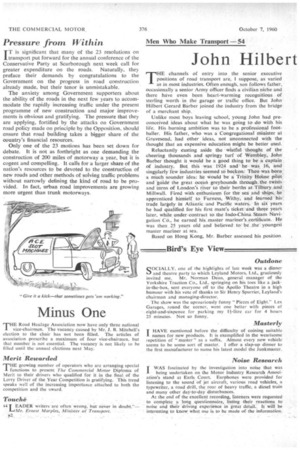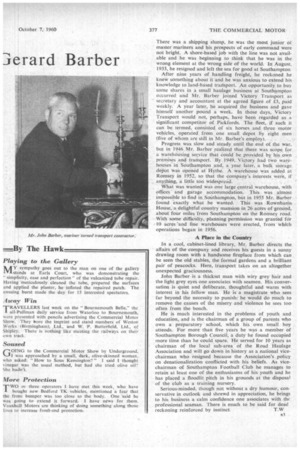John Hilbert iierard Barber
Page 36

Page 37

If you've noticed an error in this article please click here to report it so we can fix it.
THE channels of entry into the senior executive positions of road transport are, I suppose, as varied as in most industries. Often enough, son follows father, occasionally a senior Army, officer finds a civilian niche and there have even been heart-warming recognitions of sterling worth in the garage or traffic office. But John Hilbert Gerard Barber joined the industry from the bridge of a merchant ship.
Unlike most boys leaving school, young John had preconceived ideas about what he was going to do with his life. His burning ambition was to be a professional footballer. His father, who was a Congregational minister at Gravesend, had other ideas, not unconnected with the• thought that an expensive education might be better used.
Reluctantly casting aside the 'wistful 'thought of the cheering thousands and springy turf of Wembley, John Barber thought it would be a good thing to be a captain of industry. But this was 1924 and he was 16, and singularly few industries seemed to beckon. Then was born, a Muth sounder idea: he would be a Trinity House pilot and guide the great ocean greyhounds. through Abe twists and turns of London's river to their berths at Tilbury .and Millwall. Fired with enthusiasm for the sea and ships, he apprenticed himself to Furness, Withy, and learned his trade largely in Atlantic and Pacific waters. In • six years he had qualified. for his first mate's ticket:and three years later, while under.contract to the Indo-China Steam. Navigation' Co., he earned his .master mariners certificate lie was then 25 years old and believed to be the youngest master mariner at sea.
Based on Hong Kong, Mr. Barber assessed his position
There was a shipping slump, he was the most junior ol master mariners and his prospects of early command were not bright. A shore-based job with the line was not available and he was beginning to think that he was in the wrong element at the wrong side of the world. In August, 1933, he resigned and left the sea for good at Southampton. After nine years of handling freight, he reckoned he knew something about it and he was anxious to extend his knowledge to land-based transport. An opportunity to buy some shares in a small haulage business at Southampton ci,c7curred and Mr. Barber joined Victory Transport as secretary and accountant at the agreed figure of £3, paid weekly. A year later, he acquired the business and gave himself another pound a week. In those days, ViCtory Transport would not, perhaps, have been regarded as a significant competitor of Pickfords. The fleet, if such it can be termed, consisted of six horses and three motor
vehicles, operated from one small depot eight men (five of whom are still in Mr. Barber's employ).
Progress was slow and steady until the end of the war, but in 1946 Mr. Barber realized that there was scope for a warehousing service that could be provided by his own premises and transport. By 1949, Victory had two warehouses in Southampton .and, a year later, .a bulk storage. depot was opened at Hythe. A warehouse was added at Romsey in 1952, so that the company's interests were, if anything, a little too widespread. . r What was wanted was one large central warehouse, with offices and garage accommodation. This was almost impossible to find in Southampton, bit in 1955 Mr. Barber found exactly what he wanted. This was Rownhanis House, a delightful country mansion in 26 acres of 'ground, about four miles from Southampton on the Romsey road. With some difficulty, planning permission was granted ftir .10 acres and fine warehouses were erected, "front which operations began in 1956.
A Place in the Country In a cool, cabinet-lined library, Mr. Barber directs the affairs of the company and receives his guests in a sunny drawing room with a handsome fireplace from which can be seen the old stables, the formal gardens and a brilliant pair of peacocks. Here, transport takes on an altogether unexpected graciousness.
John Barber is a thickset man with wiry grey hair and the light grey eyes one associates with seamen. His conversation is quiet and deliberate, thoughtful and warm with interest in his fellow man. He is a magistrate who sees far beyond the necessity to punish: he would do much to remove the causes of the misery and violence he sees too often from the bench.
He is much interested in the problems of youth and education, and is the chairman of a group of parents who own a preparatory school, which his own small boy attends. For more than five years he was a member of Southampton Borough Council, a duty he found occupied more time than he could spare. He served for 10 years as chairman of the local sub-area of the Road Haulage Association and will go down in history as a national vicechairman who resigned because the Association's policy on denationalization conflicted with his beliefs. As vicechairman of Southampton Football Club he manages to retain at least one of the enthusiasms of his youth and he has placed a floodlit pitch in his grounds at the disposal of the club as a training nursery.
Serious-minded, though not without a dry humour, conservative in outlook and shrewd in appreciation, he brings to his business a calm confidence one associates with the professional seaman. There is much to be said for dead reckoning reinforced by instinct. T.W
































































































































